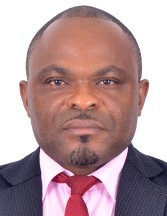
In Fall 2019, Henry Dilonga Meriki joined Wesleyan’s Department of Molecular Biology and Biochemistry through the Scholar Rescue Fund, an international nonprofit organization that provides fellowships to scholars whose safety and work are threatened by conflict in their countries. Fighting had broken out in Meriki’s home country of Cameroon between English-speaking separatist fighters and the French-speaking government.
Cameroon was colonized by both the French and British in the past. The current government sought to extinguish the remnants of the Anglophone culture through laws that threaten the common law system and marginalize the Anglophone regions (Southern Cameroon). For example, English-speaking citizens have been charged in French, a language they do not understand. When the Southern Cameroonians peacefully protested the unjust laws being enforced, the government retaliated with violence, sparking a civil war that is still ongoing.
After the conflict began, separatist fighters visited Meriki’s house to request financial support to help them continue their fight against the government.
“Many times, we have received phone calls from the separatist fighters to support them or be kidnapped,” Meriki said. “If you say contrary things, you might not survive. While having a conversation with friends, you need to watch what you say because the same people you are talking to are the same people who might report you. When they came, I was able to negotiate because all they want is for you to give them support by giving them money.”
Through the Scholar Rescue Fund, Meriki was able to leave Cameroon and begin working at Wesleyan. However, his family had to remain in Cameroon, and the violence still hits close to his home.
“There was an attempted explosion at the university where I teach, almost during my class period in the same hall,” he said. “My wife was telling me this morning, ‘You are lucky that you are out of this because we are still at risk, the bomb that exploded in that taxi, you could have been a victim. The explosion in the classroom, you could find yourself in that classroom.”
In Cameroon, Meriki taught and conducted research in the Department of Microbiology and Parasitology at the University of Buea Medical School. The conflict increasingly jeopardized his work and safety. The separatists began enforcing “ghost town days” during which no citizens were allowed to participate in social or economic activities. By doing so, they hoped to identify individuals who sympathized with the government. As a result, Meriki faced the consequences from the government if he chose to respect ghost town days, but at the same time risked retaliation from separatists if he did not.
Meriki earned a Ph.D. in Microbiology and a Master’s in Public Health from the University of Buea. His research has focused on the genetic and epidemiologic factors involved in the spread of HIV, tuberculosis, and hepatitis, in addition to drug resistance exhibited by these pathogens. At Wesleyan, he teaches a course on the fundamentals of public health and a microbiology lab. Public health fascinates Meriki because he views it as a crossroads between the STEM disciplines and values its preventative nature.
“Instead of spending all this time with curative medicine and trying to cure patients when they are already sick, we can change things and educate people so that they do not become ill in the first place because there are a lot of ailments and diseases that can be prevented,” he said.
Upon coming to Wesleyan, Meriki stated it was not his background or the color of his skin that made him feel different, but rather the differences in infrastructure that he saw.
“Back home, we study most of the disciplines theoretically with very minimal exposure to high-tech scientific instrumentations,” he said. “Most of the resources are not available, and they are costly.”
The ease of access that Wesleyan students have to high-grade instruments particularly stood out to Meriki.
“Students at the undergraduate level are exposed to so much that you would not see even at the Ph.D. level in Cameroon,” he said. “When I learned that Wes has three electron microscopes, I felt a little intimidated because that is a piece of equipment that we can find just a few in the African continent.”
Meriki emphasized that broadening access to such resources and research, in general, is essential for advancing the STEM fields.
“People of different minds, people of different cultures, think differently,” he said. “If you ask them to come up with a solution to a problem, they will approach it in different ways. The innovations and groundbreaking research that scientists do are to improve humanity. It is not only for Americans nor Europeans. The COVID vaccine is not only for Americans or for the British- it has to go to other populations. Bringing people of diverse origin, beliefs, and cultures into research allows for greater acceptability of the results. Creating an inclusive society where we can accept and tolerate each other in our differences and enjoy life is very important.”

